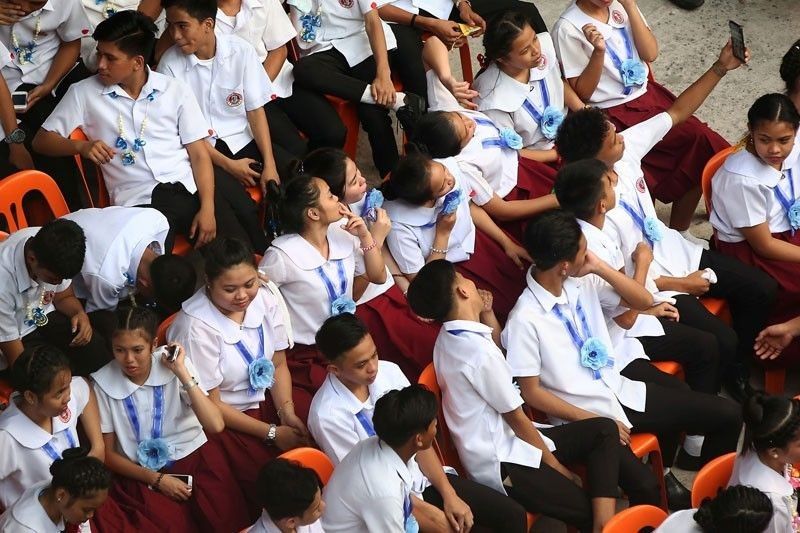Marcos urged to get all education agencies 'on the same page'

MANILA, Philippines — The country's learning crisis has become so pervasive at all levels that different agencies need to consolidate their policies to drive effective reforms, according to a congressional body tasked with reviewing the education system.
Senators serving as commissioners of the Second Congressional Commission on Education (EDCOM 2) on Tuesday filed a concurrent resolution urging President Ferdinand Marcos Jr. to create a "cabinet cluster" to unify the current fragmented implementation of education policies and reforms.
Senate Concurrent Resolution No. 21 was filed by Senators Sherwin Gatchalian, Alan Peter Cayetano, Koko Pimentel III and Joel Villanueva and follows the filing of a similar resolution filed at the House of Representatives on July 16.
What is a cabinet cluster?
EDCOM 2 is pushing for the creation of a cabinet cluster composed of the three main education agencies: the Department of Education (DepEd), the Commission on Higher Education (CHED) and the Technical Education and Skills Development Authority (TESDA).
Besides these three agencies, EDCOM 2 wants the cluster to include the participation of the Department of Labor and Employment (DOLE) and the support of the Department of Budget and Management (DBM).
The EDCOM 2 commissioners are proposing that the cluster be led by an existing cabinet member with a "direct stake in education" with funding from the DBM.
"We need to make sure that everyone in government is on the same page and headed in the same direction, especially as we seek to reverse the country’s education crisis,” Gatchalian said in a news release.
EDCOM 2 Executive Director Karol Yee said the creation of a cluster is "long overdue" given the lack of effective coordination among education agencies.
“While the EDCOM continues to study longer-term structural reforms that it could propose, the creation of this Cabinet Cluster will ensure that education priorities and directions build on one another, and result in an integrated delivery of quality education that each Filipino learner deserves," Yee said.
Why unify different education agencies?
The current setup, with multiple agencies overseeing different aspects of education, has led to overlapping functions, inefficiencies and a lack of coherence in policy implementation, EDCOM 2 said.
In its Year One report, the congressional body pointed out that since the "trifocalization" or separation of education agencies into DepEd, CHED and TESDA in the 1990s, there has been a "lack of effective coordination among education agencies toward agreed-upon goals."
Splitting education agencies into three was the recommendation of the first EDCOM in the 1990s to allow each agency to focus on the unique challenges of specific sectors, in this case, basic, higher and technical-vocational education.
By creating a cabinet cluster for education, the senators proposed that the government can streamline decision-making, improve coordination among agencies and ensure an effective allocation of resources.
In an earlier letter to the president, EDCOM 2 urged Marcos to create a cluster of agencies that would be responsible for the "cohesive and coherent implementation of all laws, policies, and reforms on education across all government and non-government stakeholders, as well as the formulation of an integrated national education and workforce development plan," EDCOM 2 said.
'Interagency bodies' insufficient
In its report, EDCOM 2 said that while there were attempts to align DepEd, CHED and TESDA's policies — such as during the implementation of the K to 12 curriculum or improving teacher education — the mere creation of interagency bodies are not enough.
The congressional body counts at least 68 interagency bodies created through legislation, agency issuances and agreements that fall short of addressing the complex needs of the education sector.
These bodies are either overly broad or specific in their scope and often hold sporadic meetings that keep policies from being effectively implemented.
For instance, the Interagency Committee on Economic and Financial Literacy "have a very narrow focus" and lacks the comprehensive approach required to address systemic issues, EDCOM 2 said in its report.
In contrast, bodies like the Social Development Committee juggle a myriad of concerns from health to housing, diluting their focus on education.
Meanwhile, officials of DepEd, CHED and TESDA often cite the irregularity of meetings and lack of continuity among interagency bodies.
The Philippine Qualifications Framework-National Coordinating Council (PQF-NCC), which is required to have a permanent secretariat by law, remains stalled due to delays in staffing and funding. The lack of a coordinated financing plan and comprehensive strategic plan exacerbates delays in fully operationalizing the PQF-NCC, the report added.
Attendance at all interagency bodies is also reportedly time-consuming: TESDA and CHED each participate in nearly a third of the 68 bodies, with 26 and 24 memberships respectively.
Meanwhile, DepEd has the highest number of commitments, with 64 memberships and additional responsibilities including regional and international roles, such as representing 14 Southeast Asian Ministers of Education Organization centers and various ASEAN and UNESCO working groups.
- Latest
- Trending































